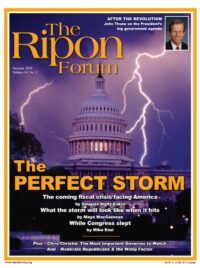The Looming Fiscal Crisis Facing America
 A United States fiscal crisis is now a threatening reality.
A United States fiscal crisis is now a threatening reality.
It wasn’t always so, even though for many years the Congressional Budget Office has published a pessimistic Long-Term Budget Outlook.
Each edition would reveal an inexorable increase in entitlement and other spending, from the traditional level of 20 cents out of every national dollar to between 30 and 40 cents over the next 30 years.
Despite this gloomy forecast, nobody seemed to care. Bond markets were quiescent. Voters were indifferent. And politicians were positively in denial that the “spend now, worry later” era would ever end.
Those were the good old days. Now Greece, Portugal, Spain, Ireland, and even Britain are under the scrutiny of skeptical financial markets. And there are signs that the U.S. is next.
The federal government ran a fiscal 2009 deficit of $1.4 trillion – the highest since World War II – as spending reached nearly 25 percent of GDP and receipts fell below 15 percent of GDP. In each case, the results are unlike those experienced during the last 50 years.
Going forward, there is no relief in sight. Over the next 10 years … the deficit will never fall below $700 billion.
Going forward, there is no relief in sight. Over the next 10 years, according to the CBO’s analysis of the President’s Budgetary Proposals for Fiscal Year 2011, the deficit will never fall below $700 billion. Ten years from now, in 2020, the deficit will be 5.6 percent of the GDP, roughly $1.3 trillion, of which over $900 billion will be devoted to servicing debt on previous borrowing.
The U.S. will be perilously close to effectively getting a new credit card simply to pay off the old one.
It’s the Spending, Stupid
The budget outlook is not the result of a shortfall of revenues.
The CBO projects that over the next decade the economy will fully recover and revenues in 2020 will be 19.6 percent of GDP – over $300 billion more than the historic norm of 18 percent.
Instead, the problem is spending. Federal outlays in 2020 are expected to be 25.2 percent of GDP – which is about $1.2 trillion higher than the 20 percent that has been business as usual in the postwar era.
As a result of the spending binge, in 2020 public debt will have more than doubled from its 2008 level to 90 percent of GDP, and will continue its upward trajectory. Traditionally, a debt-to-GDP ratio of 90 percent or more is associated with the risk of a sovereign debt crisis. Indeed, there are warning signs even before the debt rises to those levels.
As outlined in a recent report, the credit rating agency Moody’s looks at the fraction of federal revenues dedicated to paying interest as a key metric for retaining a triple-A rating. Specifically, the large, credit-worthy sovereign borrowers are expected to devote less than 10 percent of their revenues to paying interest. Moody’s grants the U.S. extra wiggle room based on its judgment that the U.S. has a strong ability to repair its condition after a bad shock. The upshot: no downgrade until interest equals 14 percent of revenues.
This is small comfort as the Obama Administration budget targets 2015 as the year when the federal government crosses the threshold and reaches 14.8 percent. Moreover, the plan is not merely to flirt with a modest deterioration in credit-worthiness. In 2020, the debt-to-GDP ratio reaches 20.1 percent. The U.S. is on track for a junk bond bonanza.
Perhaps even more troubling, much of this borrowing comes from international lending sources, including sovereign lenders like China that do not share our core values.
What happened? First, the U.S. frittered away its lead time. It was widely recognized that the crunch would only arrive when the baby boomers began to retire.
Well, guess what? The very first official baby boomer chose early retirement at age 62. Crunch time arrived and nothing was done in the interim to solve the basic spending problem – indeed the passage of the Medicare prescription drug bill in 2003 made it worse.
Second, the events of the financial crisis and recession used up the federal government’s cushion. In 2008, debt outstanding was only 40 percent of GDP. Already it is over 60 percent and rising rapidly.
Third, active steps continue to make the problem worse. The recently passed health care “reform” bill adds two new entitlement programs for insurance subsidies and long-term care insurance without fixing the existing problems in Social Security, Medicare, and Medicaid.
Financial markets no longer can comfort themselves with the fact that the United States had time and flexibility to get its fiscal act together. Time passed, wiggle room vanished, and the only actions taken made matters worse.
Financial markets no longer can comfort themselves with the fact that the United States had time and flexibility to get its fiscal act together. Time passed, wiggle room vanished, and the only actions taken made matters worse.
No Bright SideUnless Something is Done
For Main Street America, the fiscal crisis comes in two unpalatable flavors. Under the “good news” version, the debt will continue to edge northward – perhaps at times slowed by modest and ineffectual “reforms” – and borrowing costs in the United States will remain elevated. Profitable innovation and investment will flow elsewhere in the global economy. As U.S. productivity growth suffers, wage growth stagnates and standards of living stall. With little economic advancement prior to tax, and a very large tax burden from the debt, the next generation will inherit a standard of living inferior to that bequeathed to this one.
Under the “bad news” version, international lenders revolt over the outlook for debt and cut off U.S. access to international credit. In an eerie reprise of the recent financial crisis, the credit freeze would drag down business activity and household spending. The resulting deep recession would be exacerbated by the inability of the federal government’s automatic stabilizers – unemployment insurance, lower taxes, etc. – to operate freely. Again, the upshot is that America fails its fundamental responsibility to leave to the next generation freedoms and prosperity greater than those of the past.
Of course, it need not happen at all. Congress and the Administration must rein in spending and stabilize federal debt relative to GDP.
Of course, it need not happen at all. Congress and the Administration must rein in spending and stabilize federal debt relative to GDP. Every effort should be made to maximize economic growth at the same time, so that ultimately a larger economy can more easily shoulder the burden of inherited debt. Everyone will recognize that this means changing the traditional politics of promise-and-spend for both politicians and their constituents alike. But it can happen because it must.
All that is at stake is our prosperity and our freedom. RF
Douglas Holtz-Eakin served as Director of the Congressional Budget Office from 2003 to 2005. He currently serves as President of the American Action Forum and is a Commissioner on the Congressionally-chartered Financial Crisis Inquiry Commission.




